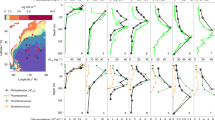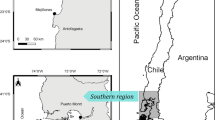Abstract
VERY large quantities of hydrocarbons have been and continue to be introduced into the seas and oceans by the various activities of man1,2 but estimates of this input and comparisons with biogenically-derived material or seepage from fossil hydrocarbon deposits are difficult to make. An assessment of the general effects of non-biogenic hydrocarbons on the marine ecosystem is equally difficult.
This is a preview of subscription content, access via your institution
Access options
Subscribe to this journal
Receive 51 print issues and online access
$199.00 per year
only $3.90 per issue
Buy this article
- Purchase on Springer Link
- Instant access to full article PDF
Prices may be subject to local taxes which are calculated during checkout
Similar content being viewed by others
References
Blumer, M., Oil Pollution of the Ocean, ref. no. 70–46 (Technical Report, Woods Hole Oceanographic Institution, 1970).
Jeffery, P. G., Oil in the Marine Environment, report no, LR 156. (Department of Trade and Industry, 1972).
Mackie, P. R., Whittle, K. J., and Hardy, R., Estuarine Coastal Mar. Sci., 2, 359–374 (1974).
Author information
Authors and Affiliations
Rights and permissions
About this article
Cite this article
HARDY, R., MACKIE, P., WHITTLE, K. et al. Discrimination in the assimilation of n-alkanes in fish. Nature 252, 577–578 (1974). https://doi.org/10.1038/252577a0
Received:
Revised:
Issue Date:
DOI: https://doi.org/10.1038/252577a0
This article is cited by
-
Comparative Studies on the Toxicokinetics of Benzo[a]pyrene in Pinctada martensii and Perna viridis
Bulletin of Environmental Contamination and Toxicology (2017)
-
Accumulation, distribution and depuration in trout of naphthenic and isoprenoid hydrocarbons (Dodecylcyclohexane and pristane)
Bulletin of Environmental Contamination and Toxicology (1982)
Comments
By submitting a comment you agree to abide by our Terms and Community Guidelines. If you find something abusive or that does not comply with our terms or guidelines please flag it as inappropriate.



